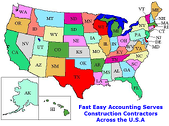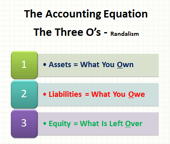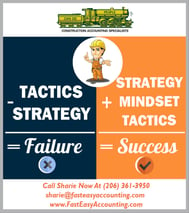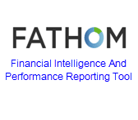
We have discussed time and again that construction accounting is different from regular accounting because of the confusion between Costs of Goods Sold and Expenses, and that is one of the significant issues here. Also billing and invoicing is a bit more complicated because the sales are not usually one receipt or invoice.
When the economy is expanding, demand for construction balloons rapidly and almost overnight construction companies phones are ringing off the hook as demand outstrips supply because so many contractors gave up and left the industry.
Unseasoned hungry contractors try to seize the opportunity to grow their businesses rapidly and haphazardly by bidding on any project that is given to them. They end up winning a large share of projects without giving any thought to calculating their company Expansion Path Isoquants, infrastructure, logistical support, working capital requirements, The 80 20 Rule For Construction Businesses, Job Costs, and Key Performance Indicators (KPI).
When the tangible world of things that can be seen, smelled, touched, tasted and felt is given disproportionally more value than the intangible elements which cannot be experienced in the physical world like bookkeeping, taxes, payroll, cash flow, bank balances, job costing, job profitability - the business is heading for trouble.
The inevitable chaos caused by too much work and not enough resources leads to the contractor becoming a pipe through which money flows with increasing velocity, and not in a fun way. Unfortunately, many contractors become victims of their success and discover too late the value of the intangible needs of the company.
Take for example: The construction company starts small; the owner is a visionary who understands the "Tangible" side of the business. They know how to bid, sell, produce, and manage the company as it grows to roughly $5,000,000 in annual sales without having a clearly defined Business Process Management System or Strategy.
When they take their business to the next level not having a strategy or as I refer to it the "Intangible" side of the management equation, they often end up going bankrupt, several times in most cases, before hiring us or someone else to help them put together a strategy that includes the "3 P's" Processes, Procedures and Policies. It has been said, "The same law that binds the ignorant frees the wise."
One way to handle your "intangibles" is taking care of your resources - Labor, Materials, Other costs, and Subcontractors (LMOS). We are actively involved in teaching the benefits of our LMOS system and how to incorporate it into best practices for businesses.
We conduct training on how to use our LMOS system on our podcast, as a guest on other podcasts, participating in seminars, and online conferences.
LMOS helps construction companies get a better understanding of costs. Without LMOS they have one large cost bucket for every cost code. With LMOS they can review the costs at a granular level and know when it is best to:
- Perform work with in-house Labor vs. Subcontracting.
- Buy Material locally vs. ordering it online.
- Use Other outside services to provide plans and permits.
- Subcontract outside services vs. investing in tools and equipment rarely used.
In our Construction Accounting Academy, we have a class devoted entirely to teaching our LMOS system. It goes into detail how to set up LMOS in QuickBooks desktop.
In conclusion
About The Author:
 Randal DeHart, PMP, QPA is the co-founder of Business Consulting And Accounting in Lynnwood Washington. He is the leading expert in outsourced construction bookkeeping and accounting services for small construction companies across the USA. He is experienced as a Contractor, Project Management Professional, Construction Accountant, Intuit ProAdvisor, and QuickBooks For Contractors Expert. This combination of experience and skill sets provides a unique perspective which allows him to see the world through the eyes of a contractor, Project Manager, Accountant and Construction Accountant. This quadruple understanding is what sets him apart from other Intuit ProAdvisors and accountants to the benefit of all of the construction contractors he serves across the USA. Visit http://www.fasteasyaccounting.com/randal-dehart/ to learn more.
Randal DeHart, PMP, QPA is the co-founder of Business Consulting And Accounting in Lynnwood Washington. He is the leading expert in outsourced construction bookkeeping and accounting services for small construction companies across the USA. He is experienced as a Contractor, Project Management Professional, Construction Accountant, Intuit ProAdvisor, and QuickBooks For Contractors Expert. This combination of experience and skill sets provides a unique perspective which allows him to see the world through the eyes of a contractor, Project Manager, Accountant and Construction Accountant. This quadruple understanding is what sets him apart from other Intuit ProAdvisors and accountants to the benefit of all of the construction contractors he serves across the USA. Visit http://www.fasteasyaccounting.com/randal-dehart/ to learn more.
Our Co-Founder Randal DeHart - Is a Certified PMP (Project Management Professional) with several years of construction project management experience. His expertise is construction accounting systems engineering and process development. His exhaustive study of several leading experts including the work of Dr. W. Edward Deming, Michael Gerber, Walter A. Shewhart, James Lewis and dozens of others was the foundation upon which our Construction Bookkeeping System is based and continues to evolve and improve. Check out our Contractor Success Map Podcast on iTunes.
OUTSOURCED ACCOUNTING FOR
THE BUSY CONTRACTOR
IN A MOBILE ENVIRONMENT
Download the Contractors APP today from the App Store or Android Store
Access Code: FEAHEROS
Click here to download the App on Android:
Click here to download the App on iOS:
Simply scan the QR code or search for ‘MyAccountants’ in the App Store and enter the Access code: FEAHEROS to utilize the powerful App features and capabilities, and benefit from having our Construction Accounting App at your fingertips, 24/7."
PS: Even if you are not a Construction Contractor you will find a plenty of benefits in the app so we invite you to download it too! It's Free so why not?


































